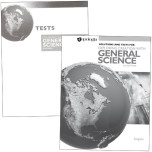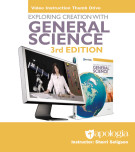We use cookies to make your experience better. To comply with the new e-Privacy directive, we need to ask for your consent to set the cookies. Learn more.
Designed as a student’s first middle school science course, Exploring Creation with General Science by Apologia teaches the three branches of science while guiding students in the development of independent learning skills. Within the three branches, students study astronomy, geology, paleontology, meteorology, oceanography, marine science, life science, environmental science, and a basic overview of chemistry, physics, and biology. The history of science, scientific inquiry and the scientific method, documenting and interpreting experimental results, and scientific analysis are also covered. A biblical worldview is emphasized through the scripture references (NIV/NLT), creation connections, and the stories of scientists who believe the study of science declares the glory of God. Anatomy is not covered to prevent overlap of content from the Young Explorer Anatomy and Physiology course.
Exploring Creation with General Science contains 14 modules (chapters), with a suggested 4 day per week schedule. Each module will take 2 - 2 ½ weeks to complete, with the student spending one hour per day studying science. A suggested daily schedule is found in the companion Student Notebook. According to the publisher, 3 components are required: the Student Textbook, Student Notebook, and Solutions Book with Test Pages. Optional supplements are also available, including an MP3 Audio CD and a Video Instruction Thumb Drive. All components are sold individually or in one of several convenient sets below. Experiments and activities are integral to learning in this course. Numerous household items and science supplies are needed to complete all labs in the course; you may opt to gather these yourself or purchase the convenient Lab Kit from Nature’s Workshop Plus, which includes most of the necessary items.



















